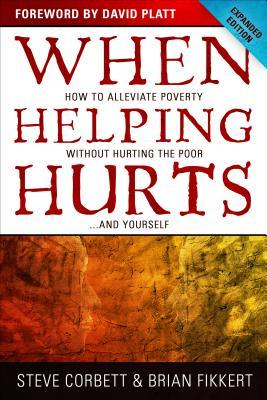Book Review: When Helping Hurts

 At church, we have been struggling with how to best help those in crisis in our own community. Since we are a downtown church in an area with a high level of poverty, we receive many requests for assistance from individuals and families. So many people are struggling to pay their bills. High electric rates coupled with high unemployment levels lead to despair and hopelessness. The requests have been increasing, so we are slowing down to see if we are truly helping those in need or hurting them by how we handle benevolence and assistance.
At church, we have been struggling with how to best help those in crisis in our own community. Since we are a downtown church in an area with a high level of poverty, we receive many requests for assistance from individuals and families. So many people are struggling to pay their bills. High electric rates coupled with high unemployment levels lead to despair and hopelessness. The requests have been increasing, so we are slowing down to see if we are truly helping those in need or hurting them by how we handle benevolence and assistance.
One of my missionary friends suggested this book to me last year, and this seemed like the perfect time to read it. We ordered several copies of When Helping Hurts: How to Alleviate Poverty Without Hurting the Poor . . . and Yourself for those on our benevolence team, and we plan on discussing this over the next few weeks. This is a great book on how we do local relief and international missions. It highlighted many of the things we are doing right, and it definitely shows areas where we need improvement.
The basis of the book is determining the appropriate response for those in crisis. The author shares “A helpful first step in thinking about working with the poor in any context is to discern whether the situation calls for relief, rehabilitation, or development.” The book then works through the Biblical basis for each, and gives practical advice and training on how to do each effectively. I highly recommend this book to anyone who wants to make a difference with people in need. It is not a call to do less or spend less, but the book challenges us to do the hard work of rehabilitation and development. Honestly, this is not easy. It is messy, and it is hard work. But if we truly want to help people who are in need, we cannot hurt them by helping them.
This book also spends a considerable amount of time talking about short-term mission trips. It encouraged me to see that much of the work we are doing oversees is truly helping. In Nicaragua, we are working on training pastors who minister to their own communities, and we have helped with a model farm that trains people in how they can provide for their families. This type of development is needed, and my hope is that this book will encourage people to do more for missions, not less.
Have you ever done anything to hurt poor people? Most of you would probably answer no to this question, but the reality is that you may have done considerable harm to poor people in the very process of trying to help them. The federal government made this mistake for decades. Well-intentioned welfare programs penalized work, undermined families, and created dependence. The government hurt the very people it was trying to help. Unfortunately, the same is true for many Christian ministries today. By focusing on symptoms rather than on the underlying disease, we are often hurting the very people we are trying to help. Surprisingly, we are also hurting ourselves in the process. As followers of Jesus Christ, we simply must do better. (from the foreword by Dr. John Perkins)
But this book does not stall in the sphere of the theological and theoretical. It moves wonderfully from timeless truth to contemporary application. As you read, you won’t just learn about problems in the world; you will discover how poverty in the world can actually be addressed. … For all of these reasons (and more), this book is virtually required reading for everyone in our church who is intentionally engaging the poor here and around the world. I cannot recommend it highly enough for anyone who is passionate about spreading and showing the love of Christ to the “least of these.” (from the foreword by David Platt)
Quotes from the book
- The task of God’s people is rooted in Christ’s mission. Simply stated, Jesus preached the good news of the kingdom in word and in deed, so the church must do the same. And as we have seen, Jesus particularly delighted in spreading the good news among the hurting, the weak, and the poor. Hence, it is not surprising that throughout history God’s people have been commanded to follow their King’s footsteps into places of brokenness.
- Poor people typically talk in terms of shame, inferiority, powerlessness, humiliation, fear, hopelessness, depression, social isolation, and voicelessness. North American audiences tend to emphasize a lack of material things such as food, money, clean water, medicine, housing, etc. As will be discussed further below, this mismatch between many outsiders’ perceptions of poverty and the perceptions of poor people themselves can have devastating consequences for poverty-alleviation efforts.
- Poverty is the result of relationships that do not work, that are not just, that are not for life, that are not harmonious or enjoyable. Poverty is the absence of shalom in all its meanings.
- one of the biggest problems in many poverty-alleviation efforts is that their design and implementation exacerbates the poverty of being of the economically rich—their god-complexes—and the poverty of being of the economically poor—their feelings of inferiority and shame.
- Poverty is rooted in broken relationships, so the solution to poverty is rooted in the power of Jesus’ death and resurrection to put all things into right relationship again.
- Poverty alleviation is the ministry of reconciliation: moving people closer to glorifying God by living in right relationship with God, with self, with others, and with the rest of creation.
- One of the biggest mistakes that North American churches make—by far—is in applying relief in situations in which rehabilitation or development is the appropriate intervention.
- Do not do things for people that they can do for themselves.
- Many North American churches and ministries are reconsidering the approaches they have been taking toward the materially poor. Many are realizing that they have been applying “relief” inappropriately and want to shift toward “development” in their work at home and abroad.
- Development is fundamentally a messy process that ultimately depends on the reconciling work of Jesus Christ (Col. 1:19–20) and the power of the Holy Spirit.
An Interview with the Authors




